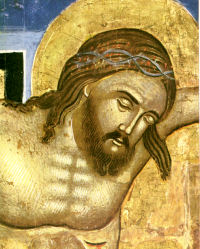» Enjoy our Liturgical Seasons series of e-books!
The weekday Masses towards the end of Lent are like a Passion Play. The Gospels, as one scene after the other, show the mounting hatred and growing tension. This is the “Abraham Mass,” telling of the inheritance received through Abraham. The Opening Prayer reminds us of our great inheritance received from Christ.
St. Benedict, "Father of Western Monasticism," twin brother of St. Scholastica feast day was moved from this date to July 11, so as to not "eclipsed" with the liturgy of Lent. Benedictine communities still honor St. Benedict on both dates.
Meditation—The Custom of Meditating on Our Lord’s Passion
My people! What have I done, in what way have I offended you? Answer me. I gave you the water of salvation which flowed from my sorrow to drink and you gave me honey and vinegar. My people, what have I done to you? (Liturgy, Good Friday).
The liturgy of these days during Lent brings us closer to the fundamental mystery of our Faith—the Resurrection of the Lord. If the liturgical year is centered upon Easter then this period demands an even greater devotion on our part, given its proximity to the sublime mysteries of divine mercy (St. Leo the Great, Sermon 47). But we should not tread this path too hastily, lest we lose sight of a very simple fact which we might easily overlook. We will not be able to share in Our Lord’s Resurrection unless we unite ourselves with him in his Passion and death (cf. Rom 8:17). If we are to accompany Christ in his glory at the end of Holy Week, we must first enter into his holocaust and be truly united to him as he lies dead on Calvary (St. Josemaria Escriva, Christ is Passing By, 95). So during these days let us accompany Jesus, in our prayers, along his painful way to Calvary and his death on the cross. As we keep him company let us not forget that we too were protagonists in all those horrors, for Jesus bore the burden of our sins (cf 1 Pet 2:24), each and every one of them. We were freed from the hands of the devil and from eternal death at a great price (cf 1 Cor 6:20), that of the Blood of Christ.
The custom of meditating on the Passion began in the very earliest days of Christianity. Many of the faithful in Jerusalem had themselves been present as Christ passed through the streets of the city on the eve of the Pasch. They would never forget Jesus’ sufferings as he made his way to Calvary. The Evangelists dedicated a good part of their writings to the detailed account of those events. We should read our Lord’s Passion constantly, said St. John Chrysostom, what great benefit we will gain by doing so. Even if you are as hard as stone, when you contemplate that He was sarcastically adorned, then ridiculed, beaten and subjected to the final agonies, you will be moved to cast all pride form your soul. How many people have been converted by careful meditation on the Passion!
St. Thomas Aquinas said that the Passion of Christ is enough to serve as a guide and model throughout our lives (St. Thomas, About the Creed). One day while he was visiting St. Bonaventure, St Thomas asked him where he had acquired such good doctrine as the one that he set out in his works. It is said that St. Bonaventure showed him a crucifix, which was blackened from all the kisses he had given it, and explained This is the book that tells me what I should write; the little I know I have learned from it (St. Alphonsus Liguouri, Meditations on Christ’s Passion). From the crucifix the saints learned how to suffer and truly love Christ. We too should learn from it. Your crucifix…As a Christian, you should always carry your crucifix with you. And place it on your desk. And kiss it before going to bed and when you wake up; and when your poor body rebels against your soul, kiss it again (St. Josemaria Escriva, The Way, 302).
Our Lord’s Passion should be a frequent theme in our prayer, but especially so in these days leading up to the central mystery of our redemption.
—Francis Fernandez, In Conversation with God

Thursday of the Fifth Week of Lent
Station with Sant'Apollinare in Campo Marzio or Sant'Apollinare alle Terme (St. Apollinaris at the Baths):
The Station in Rome is in the church of St. Apollinaris, who was a disciple of St. Peter, and afterwards bishop of Ravenna. He was martyred. The church was founded in the early Middle Ages, probably in the 7th century. Since 1990, the basilica has been the chapel of the Pontifical University of the Holy Cross, entrusted to Opus Dei.
For more on Sant'Apollinare in Campo Marzio, see:
For further information on the Station Churches, see The Stational Church.








